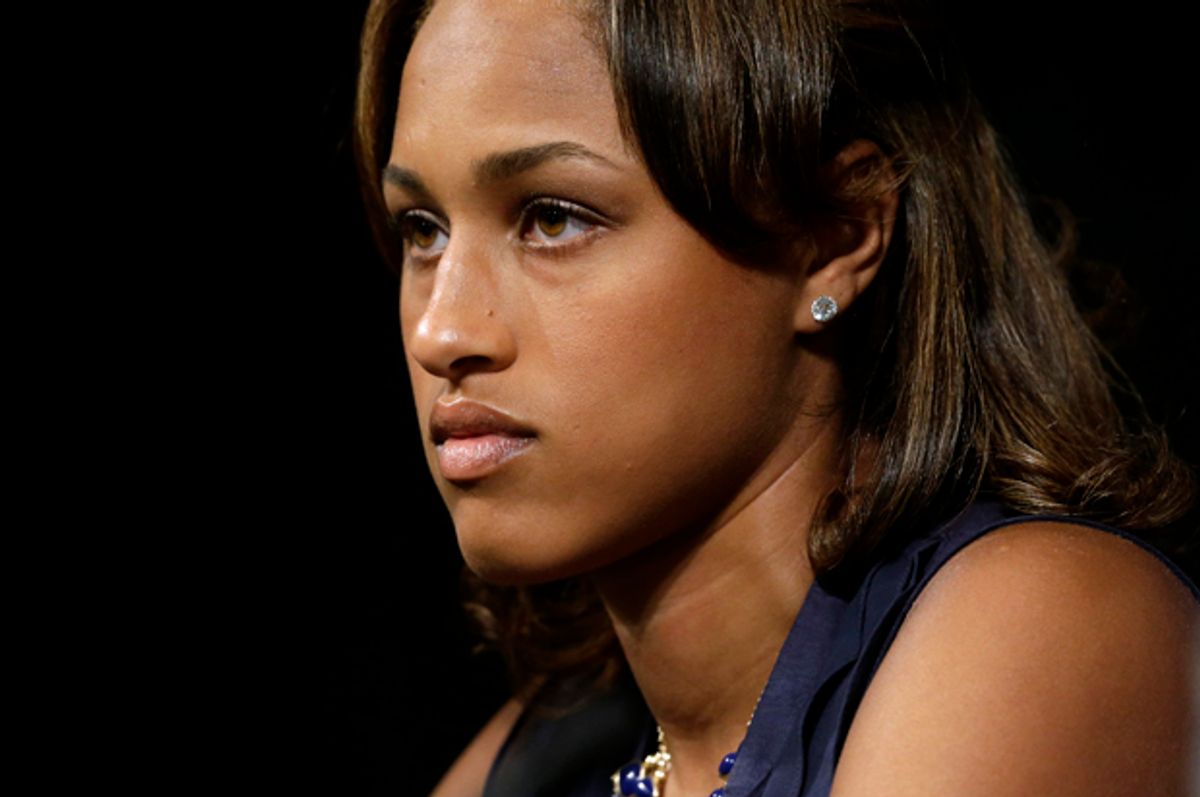Janay Rice’s essay for ESPN and her interview with Matt Lauer featured more or less the same narrative of love and forgiveness. In both, Janay said that prior to the assault in the elevator, Ray had never hit her or been abusive in their relationship. That the counseling has helped. That she had forgiven Ray because she felt he was genuinely remorseful about what he’d done. That she hoped the NFL and the public would allow her and her family to move on with their lives and allow Ray to resume his career.
There are plenty of ways you might feel about what Janay Rice said. I’ll admit that after reading the essay and watching the interview on “Today,” I worried that she was not in a safe relationship. That like so many other victims of domestic violence, she was covering for her abuser because of a complex set of loyalties -- to her partner, to her family, to her daughter, to herself -- and that the very real constraints faced by survivors -- money, housing, child custody -- had compelled her to protect a man who did not deserve her protection.
But I don’t think there is any value in interrogating Janay’s telling of her own story. In fact, I think that if Janay Rice has spoken, we should feel compelled to listen. We certainly owe her that much. Because from the start, Janay had been stripped of the ability to control her own story. When the footage of the incident was released without her consent, when the NFL elected to interview her while she was seated next to Ray and seemingly every time her name has been invoked since. In all of this, she was denied agency, and in that way, she was victimized all over again.
In telling her own story, Janay regains some of that control. And that’s a good thing.
And the fact of the matter is that Janay Rice has remained in her relationship, whether it is safe or not. And she is not alone in her situation, if that is in fact the situation she's in. Which is why we need to continue to hold people like Roger Goodell to account, people who are standing in the way of victims having the autonomy and support to tell their stories and find safety when and where they need it. That's where the conversation goes next, and is, in fact, where the conversation should have started.
What is the safest outcome for Janay Rice here? For others like her? How do we support that? What cultural shifts and new infrastructures do we need to put into place so that survivors of intimate partner violence can feel supported and, most crucially, find safety? These are the questions I’m most interested in right now, and these are not questions that Janay Rice is responsible for answering. They are on the NFL, and on us.
What counseling and support mechanisms has the NFL put into place to push back against a culture that, according to many NFL wives and partners, silences victims in the service of protecting the league? Has the league self-corrected after being criticized for bringing in only white women to oversee its domestic violence outreach efforts? What kind of legal accountability will Roger Goodell face for lying through his teeth when he said that “new information” had compelled him to level the more punishing suspension against Ray Rice? And because of the transitory nature of the job, how can the wives and partners of players feel supported and safe even when they are forced to move away from their friends, families and communities to live in new, unfamiliar cities?
These questions have nothing to do with Janay Rice and everything to do with a league and culture that condones and ignores violence. And working to answer each sends a message about the unacceptability of violence and the ongoing nature of the work that stopping that violence requires. Before us we have the possibility of putting an infrastructure into place in which victims in the NFL can seek support without fear of being retaliated against or further victimized. None of that work has happened yet, or at least not nearly enough of it.
Janay Rice has spoken. We'd all be well served to listen. And then take a long, hard look at ourselves and those around us and ask what we're doing to ensure that women in violent relationships have the resources and support they need to leave and the resources and support they need if they stay.

Shares